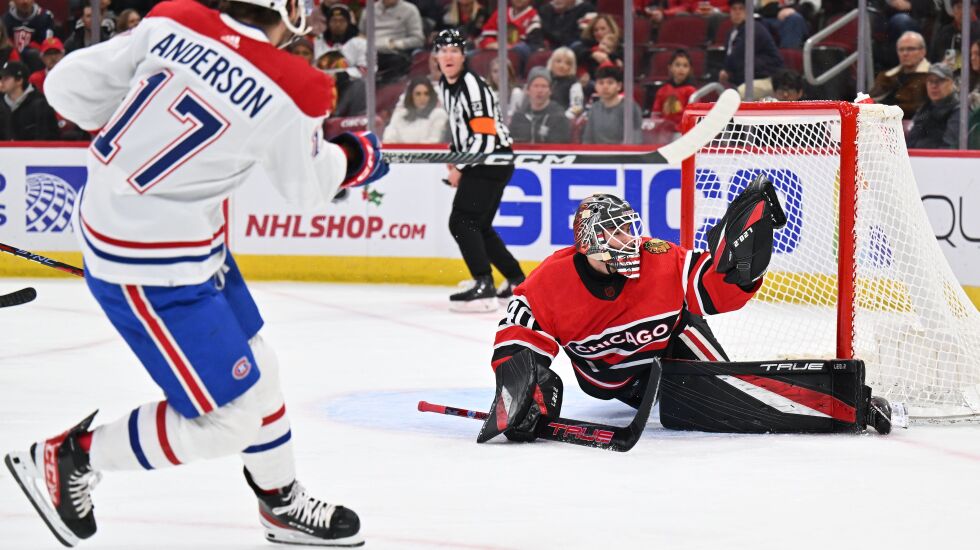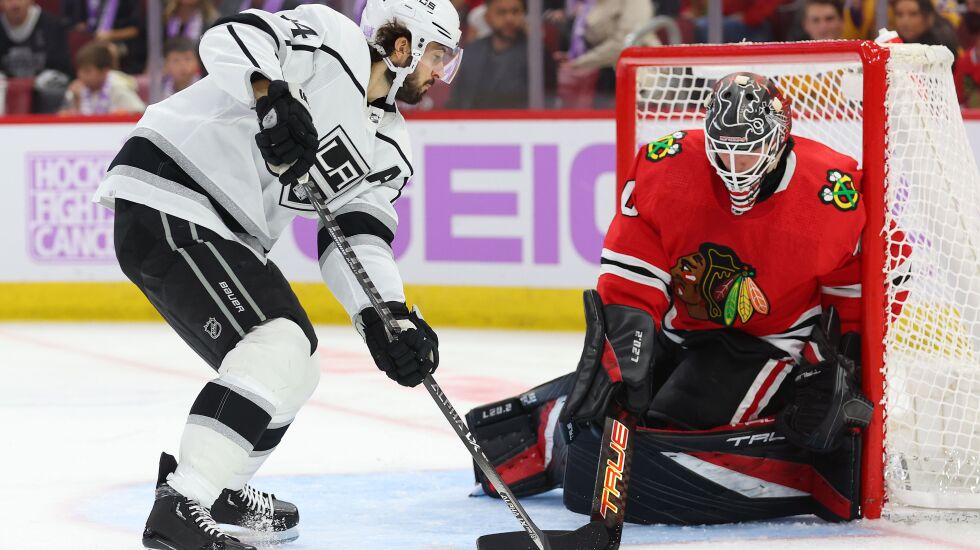
NEW YORK — Arvid Soderblom is so relaxed and confident at 23 that Blackhawks goalie coach Jimmy Waite has difficulty believing it sometimes.
“It’s pretty impressive how calm he is,” Waite said. “It almost makes me nervous how calm he is. [I ask him], ‘Are you ready to go?’ And that’s how [Corey] Crawford was — so calm.”
In his nine seasons in this role, Waite has seen 18 goalies start at least one game for the Hawks, with many of them passing through in the two years since Crawford left Chicago and ultimately retired in 2021. Waite, one of a few fixtures left after recent heavy turnover in the Hawks’ coaching staff, plans to stay “as long as they want me.”
And in Soderblom, he sees a blossoming star with the potential to stabilize the Hawks’ net in Crawford-like fashion. Waite anticipates working closely with Soderblom for many years to come.
“We have a young guy that’s probably our future,” he said. “The sky is the limit for this guy. I really like him, and the organization loves him.
“We just have to make sure we’re careful. And that was the plan this year — to be careful and not bring him up too quick. We had some injuries, but still we don’t want to push him too hard. But he keeps playing well, so we keep putting him in net. He deserves it, too.”
With opening-night backup Alex Stalock still nowhere close to returning from a concussion, Soderblom has settled into a 50-50 starting rotation with veteran Petr Mrazek.
The young Swede’s numbers don’t jump off the page — he’s 2-5-2 with a .905 save percentage, 3.24 goals-against average and plus-2.1 goals saved above expected — but that mediocrity is almost entirely the fault of the porous team in front of him.
In fact, Soderblom has looked like an above-average NHL goalie, and his combination of 6-3 size, cheetah reflexes (particularly with his glove hand) and remarkable awareness and intelligence give him elite upside.
“What I’m really impressed about is [that] his save selection is really good,” Waite said. “Knowing what to do and controlling his depth, he’s really good at that. For a young goalie like that, he understands the game well, so that’s a big plus. Obviously, he’s very talented, but he reads the game really well as well.”
Soderblom has instincts for different situations and knows which goaltending position to take before facing different types of shots — what Waite means by “save selection.”
Against sharp-angle shots, he knows whether to use an overlapping position, a “reverse VH” stance or a one-knee-down position. Against more direct attacks, he knows the correct depth at which to set up in his crease, either high to challenge a shooter or low to have time to move laterally against a passer.
Because he chooses correctly so often, he makes goaltending look easy to the untrained eye.

The overlapping approach — a technique in which his short-side pad overlaps the outside of the post instead of pushing against the inside of it — is new to him. He never overlapped when in Sweden.
But Waite is a big proponent of overlapping and has integrated it into both Soderblom’s and Mrazek’s styles. Soderblom has noticed it helping him as a “big part” of his game and cites that as evidence of his solid rapport with Waite.
“It has been great,” Soderblom said. “Even the short time I was up here last year with him felt good. And then this year, we’ve been working more consistently.
“When you work together on a daily basis, it’s easier to connect and understand how each other works. [We know] how I want the feedback and how he works with feedback. It feels like we’re connecting more and more each day.”
The first time Waite compared Soderblom to Crawford, the remark seemed to slip out almost absentmindedly. But when asked about it, Waite reflected for a moment and doubled down.
“Both guys have simple games,” he said. “Crow was always [focused on] beating passes, being set against every shot. That’s one of the basics I tell goalies to do — beat the plays and be set — so [Soderblom is] doing that well. He’s good around his posts like Crow. [They’re] two big guys. So, yeah, they look quite a bit alike.”
Crawford was still mostly playing in the AHL at 23; he didn’t break through full-time to the NHL until he was 25. Soderblom, therefore, isn’t just ahead of the Hawks’ development schedule for him but also ahead of the career trajectory of the team’s best modern-era goalie.
So is it possible that Soderblom, if all goes right in the years ahead, could have a career like Crawford’s?
“Why not?” Waite said.
That’s surely exciting for the Hawks as they search for the pillars around which to build their next contending team.
More from Waite
The overlapping approach, while increasingly popular and effective, shouldn’t be used universally against sharp-angle plays, Waite said. It limits and slows a goalie’s ability to move laterally because he can’t push off the post. For it to work best, the defensemen need to take away all cross-crease passing lanes.
If an opposing forward does come open on the weak side, Waite instructs his goalies to switch to the “reverse VH,” in which one pad lays flat on the ice against the post and the other stays upright or diagonal. That position allows for quicker post-to-post movement.
“It’s never black or white how to play a situation,” Waite said. “Reading the game is so important for any goalie. We’re going to practice about two or three tools to use, but you have to make the decision when to use them. And then we watch the video to see, ‘OK, what should we have done on that play?’”
It’s also sometimes worth changing positions just for the sake of changing them.
“If you become too predictable as a goalie, that’s when you start getting picked apart,” Waite said. “We study the goalies from the other teams, too. That’s part of my [opponent] pre-scout. You have to be unpredictable sometimes. . . . If you’re always down on your post, guys will know what’s open.”







